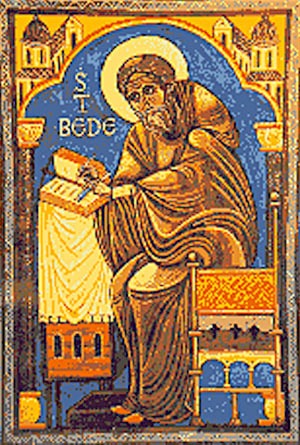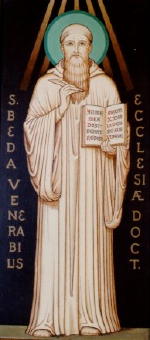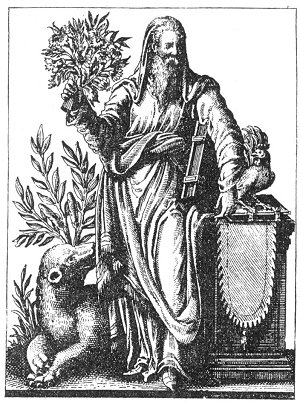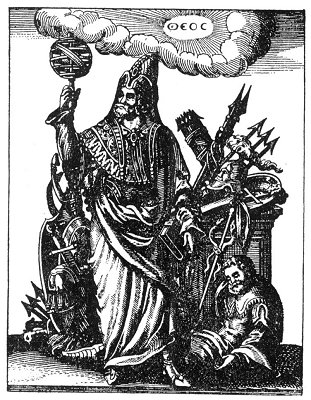Few lives afford less material for the biographer than Bede’s; few seem to possess a more irresistible fascination. Often as the simple story has been told, the desire to tell it afresh appears to be perennial. And yet it is perhaps as wholly devoid of incident as any life could be. The short autobiographical sketch at the end of the “Ecclesiastical History” tells us practically all: that he was born in the territory of the twin monastery of Wearmouth and Jarrow; that at the age of seven he was sent by his kinsfolk to be brought up, first under the Abbot Benedict, afterwards under Ceolfrid; that in his nineteenth year (the canonical age was twenty-five) he was admitted to the diaconate, and received priest’s orders in his thirtieth year, in both instances at the hands of John, Bishop of Hexham, and by order of the Abbot Ceolfrid; that he spent his whole life in the monastery in learning, in teaching, and in writing, and in the observance of the monastic rule and attendance at the daily services of the Church. Of his family we know nothing; the name Beda appears to have been not uncommon. The fact that he was handed over by kinsmen (“cura propinquorum”) to Abbot Benedict would seem to imply that he was an orphan when he entered the monastery at the age of seven, but it was not unusual for parents to dedicate their infant children to the religious life, in many cases even at an earlier age than Bede’s. We may compare the story of the little boy, Aesica, at Barking, related by Bede, and of Elfied, the daughter of Oswy, dedicated by her father before she was a year old.
The epithet “Venerable,” commonly attached to his name, has given rise to more than one legend. It was apparently first applied to him in the ninth century, and is said to have been an appellation of priests. The best known of these legends is Fuller’s story of a certain “dunce monk” who set about writing Bede’s epitaph, and being unable to complete the verse, “Hic sunt in fossa Bedae . . . ossa,” went to bed with his task unfinished. Returning to it in the morning, he found that an angel had filled the gap with the word “venerabilis.” Another account tells how Bede, in his old age, when his eyes were dim, was induced by certain “mockers” to preach, under the mistaken belief that the people were assembled to hear him. As he ended his sermon with a solemn invocation of the Trinity, the angels (in one version it is the stones of a rocky valley) responded “Amen, very venerable Bede.”
The land on which Bede was born was granted by Egfrid to Benedict Biscop for the foundation of the monasteries a short time after the birth of Bede. Wearmouth was founded in 674, Jarrow in 681 or 682. Bede was among those members of the community who were transferred to Jarrow under Abbot Ceolfrid, and under his rule and that of his successor, Huaetbert, he passed his life. With regard to the chief dates, the authorities differ, Simeon of Durham and others placing his birth as late as 677. Bede himself tells us that he was in his fifty-ninth year when he wrote the short autobiography at the end of the History. That work was finished in 731, and there seems to be no good reason to suppose that the autobiographical sketch was written at a later time. We may infer then that he was born in 673, that he was ordained deacon in 691 and priest in 702. For his death, 735, the date given in the “Continuation,” seems to be supported by the evidence of the letter of Cuthbert to Cuthwin (v. infra). From this it appears that he died on a Wednesday, which nevertheless is called Ascension Day, implying, doubtless, that his death occurred on the eve, after the festival had begun, according to ecclesiastical reckoning. It is further explained that Ascension Day was on the 26th of May (“VII Kal. Junii”) which was actually the case in the year 735.
Beyond the testimony borne to his exceptional diligence as a student in a letter from Alcuin to the monks of Wearmouth and Jarrow, we hear nothing of his childhood and early youth. One anecdote in the Anonymous History of the Abbots may perhaps refer to him, though no name is given. It tells how, when the plague of 686 devastated the monastery, the Abbot Ceolfrid, for lack of fit persons to assist at the daily offices, decided to recite the psalms without antiphons, except at vespers and matins. But after a week’s trial, unable to bear it any longer, he restored the antiphons to their proper place, and with the help of one little boy carried on the services in the usual manner. This little boy is described as being, at the time the History was written, a priest of that monastery who “duly, both by his words and writings, commends the Abbot’s praiseworthy deeds to all who seek to know them,” and he has generally been supposed to be Bede.

Moe is the founder of GnosticWarrior.com. He is a father, husband, author, martial arts black belt, and an expert in Gnosticism, the occult, and esotericism.







